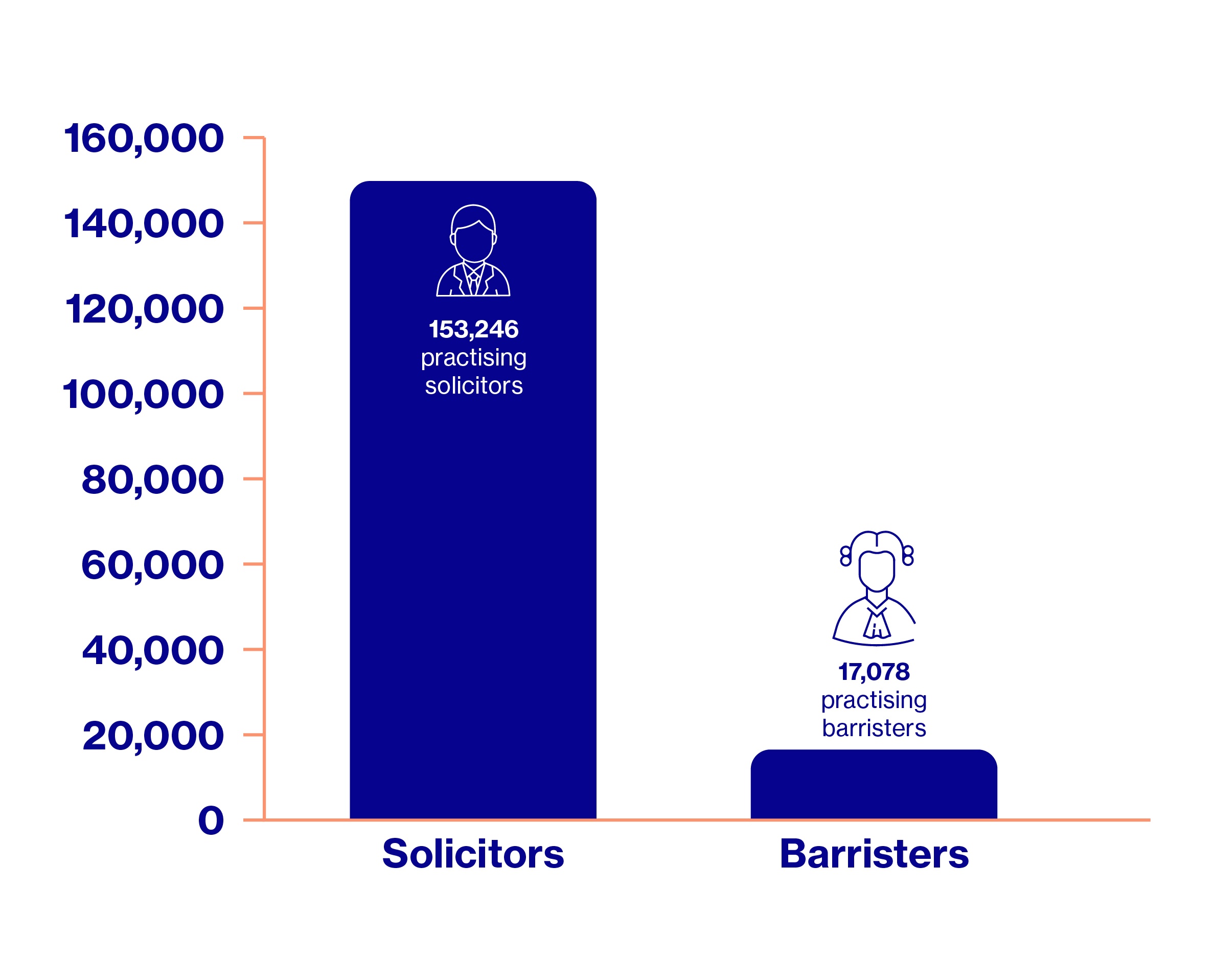
Law Training Centre’s tutor James Edenborough, a practicing Barrister, provides his personal opinions and insights into the real-life differences between the two career pathways.
Sometimes I am asked if I am a Lawyer or a Barrister. I try to be both. Some people are Barristers and Solicitors, and that certainly makes them Lawyers. You may know that ‘Lawyer’ is a general term, while Solicitors and Barristers are actually different types of Lawyer.
Before we look at the differences between Solicitors and Barristers the first thing to say is that, whilst there are still differences, with the option to obtain each other’s rights, these two legal professions, at least in some areas of law, are much closer to each other than they used to be.
What may make more of a difference to the day-to-day career experience of a Solicitor vs. that of a Barrister is the area of law and the type of organisation in which you practice. As well as different areas of practice being very different from each other, the differences between Solicitors and Barristers may also be greater in some of those areas than others.
So, what’s the difference between a Solicitor and a Barrister?
Traditionally, it was a bit like the difference between a GP and a hospital doctor.
Firstly, a Solicitor would do a lot of client contact, advise on most issues, and deal with longer term case management. A Solicitor would instruct a Barrister on behalf of their client to provide special advice and/or provide representation at higher courts. Because of that, like a hospital doctor, Barristers are described as a ‘referral’ profession, because Solicitors would refer clients to them. This still happens a good deal, however, in light of the further rights each can now obtain, which I talk about below, there is a more nuanced way of looking at the two roles.
When a Solicitor is acting for someone in a contested case, it is usually called ‘litigation’, which a Solicitor is entitled to carry out. It is quite hard to find a precise definition of litigation, but it definitely covers some activities which are central to conducting a case, like lodging formal documents at Court or serving notice of proceedings on other parties.
Solicitors also carry out lots of work which doesn’t involve a dispute, known as ‘non-contentious’ work, like conveyancing of property or drafting contracts.
Traditionally, Solicitors have handled client money, and Barristers have not. Solicitor’s firms usually have client accounts, and Barristers who represent or advise clients through Solicitors are paid by the Solicitors and not the ‘lay’ client.
So; lots of work with clients for Solicitors, and lots of training on non-contentious legal processes and conducting litigation!
A Barrister is a person who has been called to the Bar of England and Wales. A Barrister is entitled to practise as an advocate in all courts but appears in the higher courts in particular. A Barrister is commonly referred to as “Counsel”.
A Barrister offers specialist legal advice or representing clients at Court. A Barrister will ordinarily specialise in one or two areas of law, providing expert advice for work on matters of a complex nature. For example, even quite a big law firm might not have an expert in shipping law, and so might instruct a Barrister to advise.
So, what’s changed to bring the two professions closer?
Firstly, Solicitors have now been able to obtain ‘higher rights’, for quite some time; since 1994. This means they can then appear on behalf of clients in any Court, including the Crown Court, the High Court, the Court of Appeal, and the Supreme Court. This is particularly important in areas of law with a lot of advocacy; so for example it can be useful for Solicitors in criminal practice to have higher rights. That means they can do everything a Barrister can do. However, as of July 2021, in total only 7,116 practising solicitors had higher rights, according to the SRA.
Secondly, Barristers can now qualify for ‘direct access’. This means a client can go straight to them without having to go through a Solicitor. This may save the client money as they are only going to one Lawyer. The Barrister can be paid directly by the client, and this arrangement can work well in some cases. Direct access does, however, have some limitations: it doesn’t permit a Barrister to litigate, so, though they may be advised what to say, the client has to do things like lodge papers in the case or write letters to the other parties themselves.
Thirdly, a Barrister can obtain a litigation certificate, meaning that, they can do the key thing a Solicitor can do.
Different Ways of Working
There are lots of ways of working too. Barristers used to nearly always be in sets of chambers, which are a bit like a partnership, but with the main difference being that everyone is self-employed. Solicitors might be in a single partner firm, a big law firm, or in-house in a private organisation or the public sector, and Barristers can work in each of those too. For example, there are Barristers in the armed forces and in retail firms like IKEA, and there are now quite often Barristers employed in Solicitor’s firms. This makes a huge difference to the individual’s day-to-day work experience, and those deciding which career to pursue may want to consider; do you want to be self-employed and independent, or in a team, or advising an in-house client, for example in a bank? That may affect your income, the length and flexibility of your hours, and the type of work you do.
Different areas of Practice
I mentioned above that the area of law is important too. So, within criminal law for example there is a lot of advocacy involved, as well as quite a bit within other ‘common law’ areas, like family or personal injury work. Remember that although relatively few solicitors have higher rights, most criminal cases take place in the Magistrates’ Court. A solicitor’s firm might only need one or two solicitors with higher rights. However, other areas such as commercial disputes, wills and probate, and conveyancing do not require the same degree of advocacy.
It’s different doing contract work; if you love language, this might be for you! It’s different again in wills and probate, and in the very step by step logic of property practice. Why not work in the Government Legal Service, advising in a department and moving every few years? Or how about corporate law; arranging the finance for a big construction project but working late into the night?
In corporate law, you might go to a Barrister occasionally. In crime or professional regulation, you tend to all work together. If you really like client contact or advocacy, that might be what makes you choose between qualifying as a solicitor or barrister, but look at style of working and the different areas of law too.
You might want to think of each area of practice as a different career. However, moving between areas of practice does happen, and some individuals have quite a mixed practice.

So, what’s the overall picture? There are key traditional differences; Solicitors’ work has a focus on client contact, while Barristers have tended to focus on advocacy or expertise in very specific areas of law. Those differences still persist, but they aren’t the whole picture. Each profession can gain the rights of the other. There is also a really big difference in different areas of law and in different ways of working. Law really encompasses a range of different careers. So, it’s worth spending at least as much time learning about different areas of practice, and the different ways of working that may come with them, as deciding the still important question of whether to qualify as a Solicitor or Barrister. Very best of luck!

